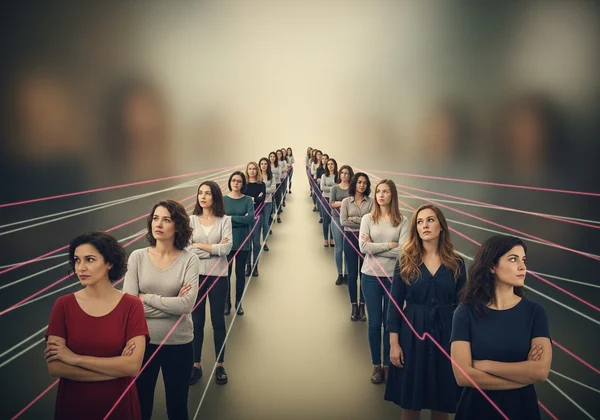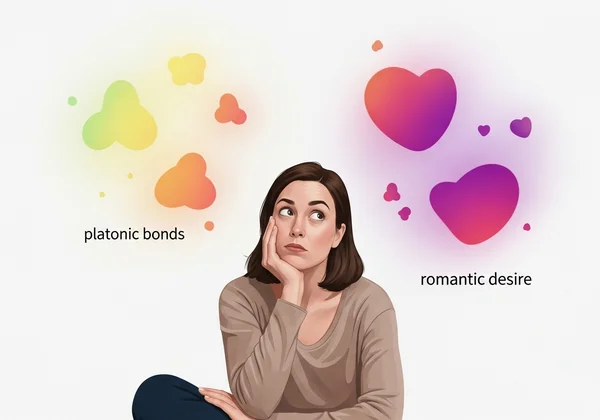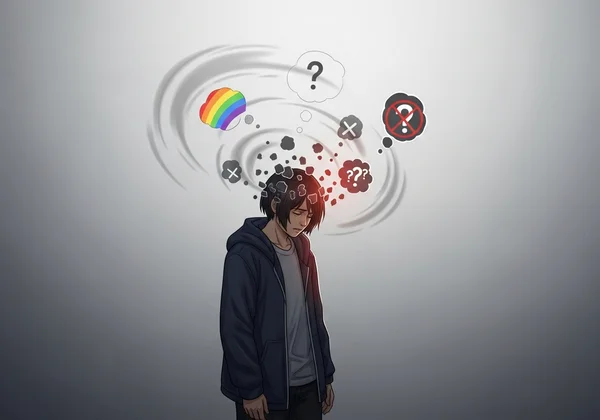Eterosessualità Obbligatoria: Un Test Lesbico per la Scoperta di Sé
Ti sei mai sentita come se dovessi essere attratta dagli uomini, anche se il tuo cuore e la tua mente sembrano tirarti in una direzione diversa? Questa sensazione di confusione è un'esperienza condivisa da molte donne che esplorano la propria identità. Stai lottando contro una pressione sociale potente, spesso invisibile, nota come eterosessualità obbligatoria. È normale mettere in discussione la propria sessualità? Assolutamente. Questa guida è qui per aiutarti a capire cos'è questo concetto, come plasma sottilmente la tua percezione di te stessa e perché decostruirlo è un passo vitale per abbracciare i tuoi veri sentimenti. Questo viaggio di auto-riflessione è profondamente personale, e un ottimo primo passo può essere quello di esplorare i tuoi sentimenti con un test lesbico di supporto.
Cos'è l'Eterosessualità Obbligatoria?
Nella sua essenza, l'eterosessualità obbligatoria, spesso chiamata "comp-het", è l'assunzione sociale che tutti siano eterosessuali e che l'eterosessualità sia l'unica espressione normale o naturale della sessualità. Non è solo un'idea, ma un sistema di credenze e norme intessuto nella trama della nostra cultura, dalle fiabe alle aspettative familiari. Questo sistema crea un ambiente in cui essere etero è la norma, e qualsiasi altra identità è vista come una deviazione che richiede una spiegazione.
Non si tratta di incolpare gli individui; si tratta di riconoscere una forza culturale che colpisce tutti, specialmente le donne. Le spinge a intraprendere relazioni eterosessuali e a dare priorità alle connessioni romantiche con gli uomini, indipendentemente dalle loro vere attrazioni. Comprendere questo concetto non significa etichettarsi immediatamente, ma darsi la grazia di vedere come le influenze esterne possano aver plasmato il proprio mondo interiore.

Comprendere le Norme Sociali e l'Eteronormatività
Per capire la "comp-het", dobbiamo considerare l'eteronormatività. Questa è la credenza che l'umanità si divida in generi distinti e complementari (uomo e donna) con ruoli naturali nella vita. Presuppone che l'attrazione eterosessuale sia lo standard. La vedi ovunque: nei film in cui l'eroe sta sempre con la ragazza, nelle pubblicità di anelli nuziali rivolte esclusivamente a coppie uomo-donna e nelle domande casuali dei parenti su quando troverai un fidanzato.
Queste norme sociali creano uno script potente che ci viene insegnato a seguire fin dalla tenera età. Questo script può essere così radicato da rendere difficile persino considerare altre possibilità per la propria vita e il proprio amore. Mettere in discussione questo script è il primo passo verso l'autentica scoperta di sé.
I Modi Sottili in Cui Influenza le Donne
L'eterosessualità obbligatoria non si manifesta sempre come pressione evidente. Spesso, la sua influenza è molto più sottile e insidiosa, inducendoti a dubitare dei tuoi stessi sentimenti. Potrebbe manifestarsi come:
- Supporre che i tuoi sentimenti intensi e totalizzanti per un'amica siano solo una "cotta per una ragazza" o una profonda ammirazione platonica.
- Sentirsi ansiose o "danneggiate" perché non si hanno cotte per i ragazzi come fanno le amiche.
- Frequentare uomini perché sembra la "cosa giusta da fare", anche se le relazioni mancano di vera chimica romantica o sessuale.
- Fantastizzare su uomini in teoria, ma sentirsi indifferenti o addirittura repulse dalla realtà di una relazione fisica o emotiva con loro.
Riconoscere questi sottili segnali è una parte fondamentale per districare ciò che desideri veramente da ciò che ti è stato insegnato a desiderare. Fare un quiz confidenziale può aiutarti a ordinare queste emozioni complesse.
Come Plasma la Tua Sessualità in Dubbio
Per chi sta mettendo in discussione la propria sessualità, la lente dell'eterosessualità obbligatoria può distorcere tutto. Crea una nebbia di confusione che rende difficile vedere chiaramente i propri sentimenti. Questo periodo di messa in discussione non riguarda la ricerca di una risposta definitiva dall'oggi al domani, ma lo spogliare questi strati di aspettative sociali per trovare l'autentico sé sottostante.
Il processo può sembrare isolante, ma milioni di persone hanno percorso questo cammino prima di te. Le tue domande sono valide e il tuo viaggio è un segno di incredibile consapevolezza e coraggio. Darsi strumenti per la chiarezza, come un test lesbico, è un atto di cura di sé.
Scambiare Legami Platonici per Desiderio Romantico
Forse hai un'amica intima che senti come il tuo intero mondo. Desideri la sua presenza, il vostro legame emotivo è profondo e l'idea che lei non sia nella tua vita ti sembra devastante. La società spesso etichetta questo semplicemente come "forte amicizia". Ma ti sei mai fermata a chiedere: i tuoi sentimenti per i tuoi amici maschi portano lo stesso intenso peso?
Questa intensa attrazione emotiva potrebbe essere più che platonica. La "comp-het" ci costringe spesso a incasellare le nostre profonde connessioni con le donne sotto l'etichetta "amicizia" perché la cartella "romantico" è riservata agli uomini. Distinguere tra legami platonici e sentimenti romantici è un passo cruciale.

La Pressione a Conformarsi: "Sono Normale?"
La sensazione di essere diversa può portare a una domanda persistente e fastidiosa: "Sono normale?". Quando tutti intorno a te sembrano seguire un percorso predeterminato di frequentare ragazzi, sposare un uomo e formare una famiglia, è facile sentirsi indietro o che ci sia qualcosa di sbagliato in te.
Questa pressione a conformarsi può causare un'immensa ansia e insicurezza. Potrebbe spingerti ad accettare appuntamenti che non ti piacciono o a simulare un interesse che non provi – solo per adattarti. Ricorda, non esiste una singola "normalità". La tua normalità è qualunque cosa ti sembri vera, e scoprire quella verità è l'obiettivo, non forzarti in una scatola che non si adatta. Un test lesbico di supporto può essere un modo delicato per esplorare questi sentimenti senza pressione.
Riconoscere il Ruolo dell'Omofobia Interiorizzata
Una conseguenza diretta e dannosa dell'eterosessualità obbligatoria è l'omofobia interiorizzata. Questo accade quando gli individui LGBTQ+ assorbono i messaggi negativi e gli stereotipi sulla propria comunità dalla società. È quella vocina nella tua testa che riecheggia il pregiudizio della società, sussurrando che essere gay o lesbica è indesiderabile, peccaminoso o qualcosa di cui vergognarsi. Un test lesbico può essere un primo passo privato per sfidare quel dubbio interiore.
Questa negatività interiorizzata può essere una barriera importante all'auto-accettazione. Crea un conflitto tra i tuoi autentici sentimenti e la paura che quei sentimenti siano sbagliati. Affrontare questo non è facile, ma è essenziale per vivere una vita piena e felice.

Segni di Insicurezza e Paura del Giudizio
L'omofobia interiorizzata spesso si maschera da insicurezza o ansia. Alcuni segni comuni di insicurezza e paura del giudizio includono:
- Pensare: "Non posso essere lesbica, sono uscita con ragazzi prima" o "Non assomiglio a una lesbica stereotipata".
- Sentire un senso di panico o disgusto quando si considera una relazione dello stesso sesso per se stessi.
- Sperare che la tua attrazione per le donne sia "solo una fase".
- Cercare costantemente conferme esterne per i tuoi sentimenti invece di fidarti della tua intuizione.
Se ti riconosci in queste affermazioni, sappi che non sei sola. Queste sono risposte apprese da una società che sta ancora imparando ad abbracciare pienamente la diversità. Riconoscerle è il primo passo per disimpararle.
Liberarsi dalle Credenze Limitanti
Superare l'omofobia interiorizzata è un processo di disimparare e di auto-compassione. Implica sfidare attivamente quei pensieri negativi. Quando appare la voce del dubbio, contrastala con affermazioni. Ricordati che la sessualità è fluida e che le tue esperienze passate non invalidano i tuoi sentimenti attuali. Una risorsa come un test lesbico può aiutare a radicarsi nei tuoi sentimenti nella verità personale, piuttosto che nella paura sociale.
Cerca rappresentazioni positive di lesbiche nei media, segui creatori LGBTQ+ e leggi storie di donne che hanno percorso un cammino simile. Immergerti in una narrativa positiva aiuta a riscrivere lo script negativo che ti è stato insegnato. Questa è la tua vita, e meriti di viverla libera da credenze limitanti.
Abbracciare la Tua Autentica Identità Lesbica: Come Sapere se Sei Lesbica
Mentre spogli gli strati della "comp-het" e dell'omofobia interiorizzata, crei spazio per abbracciare la tua autentica identità lesbica. Non si tratta di affrettarsi a un'etichetta, ma di permetterti semplicemente di essere. La tua identità è tua da definire, nel tuo tempo. Sia che tu ti identifichi come lesbica, bisessuale, queer o che tu stia ancora capendo, l'obiettivo è l'auto-accettazione. Un "test sono lesbica?" è semplicemente uno strumento, non una diagnosi – è lì per aiutare la tua scoperta personale.
Questo è un viaggio di allineamento, in cui la tua vita esterna inizia a corrispondere alla tua verità interiore. È un percorso che porta a un più profondo senso di pace, fiducia e gioia. Hai il diritto di iniziare il tuo viaggio verso quella vita autentica oggi.

Il Percorso verso l'Auto-Accettazione: Mettere in Discussione la Mia Sessualità
Il percorso verso l'auto-accettazione non è sempre lineare. Ci saranno giorni buoni pieni di chiarezza e giorni difficili pieni di dubbi. Sii paziente e gentile con te stessa durante tutto il processo. Celebra le piccole vittorie, sia che si tratti di riconoscere un'attrazione senza giudizio o di fruire di un contenuto queer che ti risuona.
Tenere un diario può essere uno strumento potente per elaborare i tuoi pensieri e sentimenti senza timore di giudizio. La terapia o la consulenza con un professionista LGBTQ+-affermativo possono fornire un supporto inestimabile. La cosa più importante è continuare ad andare avanti con curiosità e auto-compassione.
Trovare Supporto e Comunità
Non devi percorrere questo cammino da sola. Trovare supporto e comunità è una delle cose più potenzianti che puoi fare. Connettersi con altre donne che comprendono la tua esperienza fornisce validazione, conforto e un senso di appartenenza che può mettere a tacere i dubbi più forti.
Cerca gruppi LGBTQ+ locali o online, segui creatori lesbiche e queer sui social media e parla con amici fidati se ti senti sicura nel farlo. Costruire la tua famiglia scelta è una parte bellissima dell'esperienza queer. Quando vedi la tua gioia e il tuo amore riflessi negli altri, diventa più facile abbracciarli dentro di te.
Il Tuo Viaggio di Scoperta di Sé: Fai il Passo Successivo
Comprendere l'eterosessualità obbligatoria è come indossare un nuovo paio di occhiali: ti aiuta a vedere il mondo, e te stessa, più chiaramente. È uno strumento che può validare la tua confusione, spiegare le tue ansie e darti il potere di fidarti del tuo cuore. I tuoi sentimenti sono reali, le tue domande sono importanti e il tuo viaggio di scoperta di sé è un viaggio bellissimo e coraggioso.
Se questo articolo ti ha toccato, potrebbe essere il momento di fare il passo successivo e delicato. Per aiutarti a riflettere ulteriormente in un ambiente privato e di supporto, potresti considerare di fare il Test Lesbico. È uno strumento progettato con comprensione psicologica per aiutarti a esplorare le tue attrazioni e i tuoi sentimenti in modo sicuro e anonimo. Inizia la tua scoperta di te e scopri quali intuizioni potresti trovare.
Domande Frequenti sull'Eterosessualità Obbligatoria e la Scoperta di Sé
È normale mettere in discussione la propria sessualità?
Sì, è completamente normale e sano mettere in discussione la propria sessualità. Molte persone, indipendentemente dall'età, attraversano periodi di messa in discussione man mano che crescono e imparano di più su se stesse. È un segno di auto-consapevolezza, non di confusione.
L'eterosessualità obbligatoria può nascondere i miei veri sentimenti?
Assolutamente. La "comp-het" può essere così potente da farti credere sinceramente di essere eterosessuale, portandoti a reprimere o interpretare erroneamente i tuoi veri sentimenti per le donne per anni, o addirittura decenni. Svelarla può far sentire come di scoprire una parte di te che non conoscevi. Un test lesbico può aiutarti a iniziare questo processo di svelamento.
Sono lesbica o bisessuale se sono uscita solo con uomini?
La tua storia passata di relazioni non definisce il tuo orientamento sessuale. Molte lesbiche sono uscite con uomini prima di realizzare la loro vera attrazione a causa della pressione sociale e della "comp-het". La sessualità può anche essere fluida. I tuoi sentimenti attuali sono ciò che conta di più, e esplorarli con uno strumento come un test sono lesbica? può fornire chiarezza personale.
Cosa significa essere lesbica?
Essere lesbica generalmente significa essere una donna attratta romanticamente, emotivamente e/o sessualmente da altre donne. Tuttavia, l'identità è personale. Non c'è un unico modo di essere lesbica. Si tratta di ciò che ti sembra autentico e di come scegli di definire la tua esperienza di amore e attrazione.